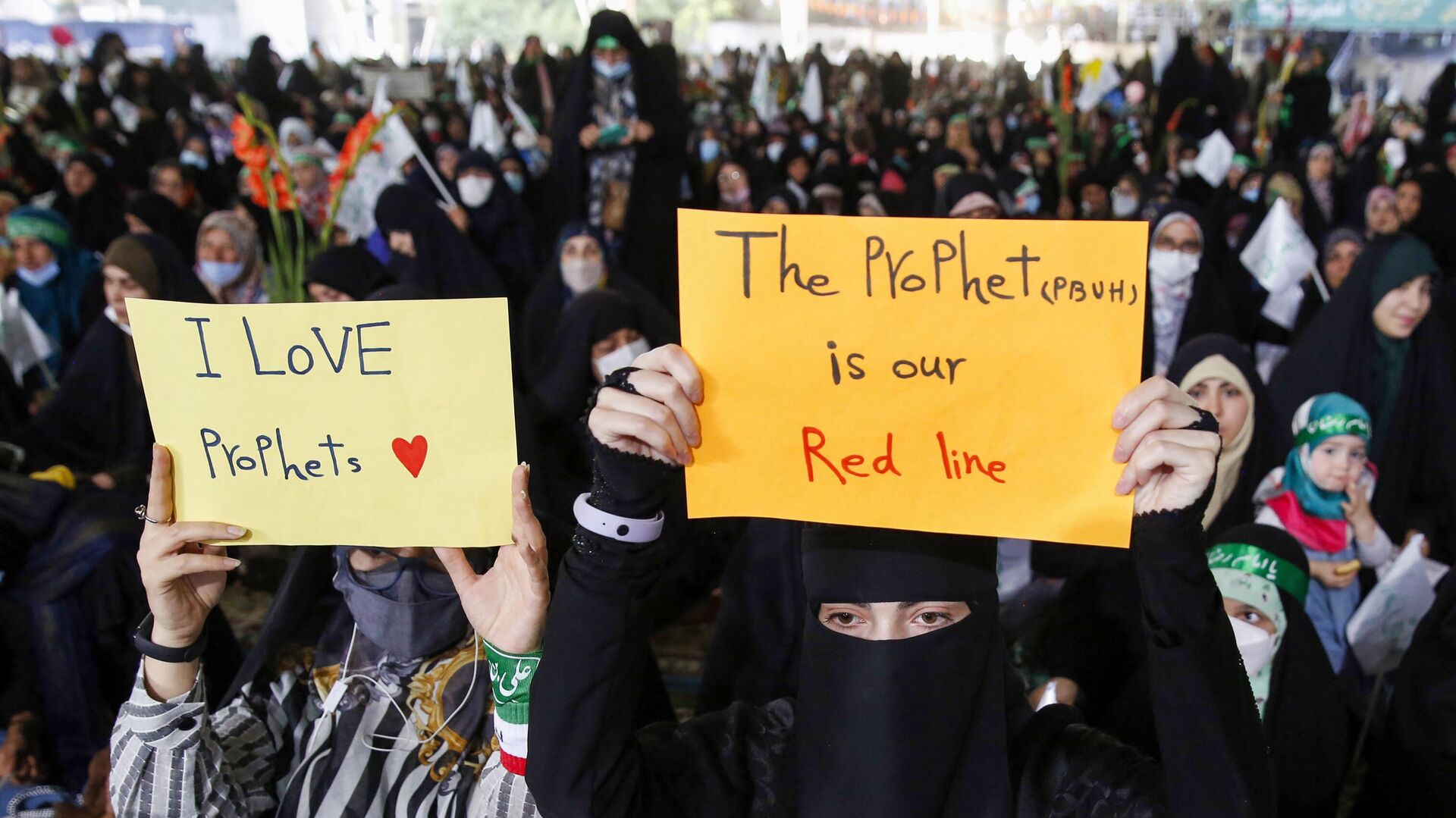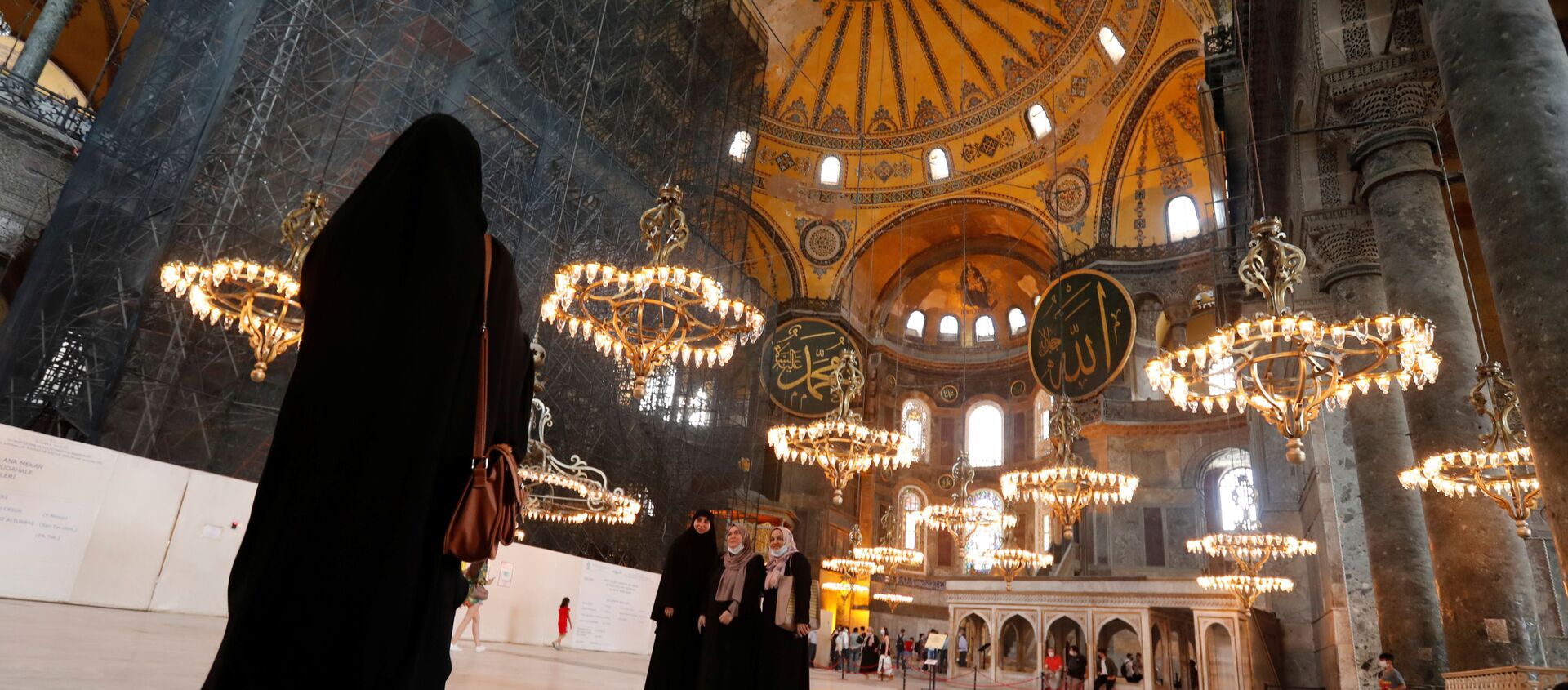https://sputnikglobe.com/20220610/expert-prophet-remarks-are-red-line-for-gulf-states-but-ties-with-india-can-weather-storm-1096196860.html
Expert: Prophet Remarks Are Red Line for Gulf States, But Strong Ties With India Can Weather Storm
Expert: Prophet Remarks Are Red Line for Gulf States, But Strong Ties With India Can Weather Storm
Sputnik International
India's growing ties with Islamic countries were dealt a blow earlier this week after spokespeople for the governing party made incendiary remarks about the... 10.06.2022, Sputnik International
2022-06-10T18:26+0000
2022-06-10T18:26+0000
2022-10-19T20:02+0000
persian gulf
gcc
organization of islamic cooperation (oic)
islamism
islam
prophet muhammad
bharatiya janata party (bjp)
qatar
uae
saudi arabia
https://cdn1.img.sputnikglobe.com/img/07e6/06/0a/1096200363_0:0:3029:1703_1920x0_80_0_0_3d59d4c20036e652460e0b1b8591377f.jpg
The federally governing Bharatiya Janata Party (BJP) suspended its national spokesperson, Nupur Sharma and expelled its Delhi media head, Naveen Kumar Jindal, following a diplomatic row and backlash from the Islamic world over their "insulting" remarks against the Prophet Muhammad.The Indian Foreign Ministry on Thursday reiterated that the "tweets and comments do not reflect the views of the Government, and this has been conveyed to our interlocutors (Gulf countries)".The Gulf nations supply India with around two-thirds of the country's total oil and gas requirement, and provide nine million Indian migrants with jobs.Sputnik spoke with Kabir Taneja, a fellow at the Delhi-based Observer Research Foundation and author of "The ISIS Peril", about the diplomatic scandal to find out whether the row could harm India's interests in the Gulf.Sputnik: Why have Islamic countries reacted sharply to the comments made by BJP spokesperson Nupur Sharma?Kabir Taneja: I think they reacted very strongly for a couple of reasons. Comments on the prophet are a red line, first and foremost. We have seen the Gulf States and other Islamic nations not raising the issue of communal violence in India, even during Ayodhya, Godhra, etc., in the past. There were never, at least publicly, strong reactions. So I think because comments were made on the prophet, some nations decided on their own merit that it was their place to make a comment.If I remember correctly, Qatar is the first one that commented. Once Qatar made a comment, there was a strong point of geopolitics also that came into play, because if Doha is rallying for protection of the prophet, then others, such as the home of the two holy mosques, Saudi Arabia, and the UAE, which is a regional power, could not be seen far behind Qatar and playing second fiddle to Qatar, which they ended up to anyway. But there is a question if Qatar wouldn't have made a big hue and cry about this, would anyone else have caused such a public outcry about it?Sputnik: Do you think the Islamic world's reaction, especially from countries like Qatar, the UAE, and Saudi Arabia, surprised New Delhi, given the deepening ties on all fronts with them in recent years?Kabir Taneja: I think that the scale of reactions took New Delhi by surprise. However, relations between India and the Gulf States are strong enough to weather this setback.Sputnik: Some media reports have claimed supermarkets in a few countries have started removing Indian goods in response to the remarks. Do you see a long-term impact on India's exports to West Asia?Kabir Taneja: No, I do not think so. Even as India's Vice President Venkaiah Naidu was in Doha when this crisis took shape, India and Qatar worked on the latter's food security being a viable part of the bilateral relationship in the future.Sputnik: The terrorist group Al Qaeda in the Indian Subcontinent* (AQIS) allegedly threatened to carry out attacks in India against the backdrop of the controversial statements on the Prophet Muhammad. What do you make of it?Kabir Taneja: Al Qaeda, Daesh* (ISIS), and others use such events as opportunities to try and recruit and push for more religious divisions in India. This is not the first time. Islamist groups have used many communal events over the years to try and instigate India's Muslim population. However, it has never worked, and this is a source of frustration for the likes of Al Qaeda as well. Indian Muslims have, on scale, rejected such elements over the years.Sputnik: India primarily depends on West Asia for its energy security and has several long-term contracts with the nations in this region. Could comments from some Hindu groups or fringe elements against Muslims potentially impact India's energy ties?Kabir Taneja: Again, no. India's energy security is a two-way street. India needs the Gulf's oil, and the Gulf needs India's voracious appetite to consume oil. In both ways, the national interests are served and will not be affected due to such issues.*Al Qaeda in the Indian Subcontinent (AQIS) and Daesh, also known as ISIS/Islamic State/IS, are terrorist groups banned in many countries, including Russia.
https://sputnikglobe.com/20200805/indian-muslim-board-warns-of-hagia-sophia-like-conversion-of-ram-temple-in-ayodhya-1080063694.html
persian gulf
qatar
uae
saudi arabia
Sputnik International
feedback@sputniknews.com
+74956456601
MIA „Rossiya Segodnya“
2022
Rishikesh Kumar
https://cdn1.img.sputnikglobe.com/img/07e4/08/04/1080055820_0:0:388:389_100x100_80_0_0_40018ee210946d65d49ffba4f4c008e1.jpg
Rishikesh Kumar
https://cdn1.img.sputnikglobe.com/img/07e4/08/04/1080055820_0:0:388:389_100x100_80_0_0_40018ee210946d65d49ffba4f4c008e1.jpg
News
en_EN
Sputnik International
feedback@sputniknews.com
+74956456601
MIA „Rossiya Segodnya“
Sputnik International
feedback@sputniknews.com
+74956456601
MIA „Rossiya Segodnya“
Rishikesh Kumar
https://cdn1.img.sputnikglobe.com/img/07e4/08/04/1080055820_0:0:388:389_100x100_80_0_0_40018ee210946d65d49ffba4f4c008e1.jpg
persian gulf, gcc, organization of islamic cooperation (oic), islamism, islam, prophet muhammad, bharatiya janata party (bjp), qatar, uae, saudi arabia, protest, muslim, sputnik
persian gulf, gcc, organization of islamic cooperation (oic), islamism, islam, prophet muhammad, bharatiya janata party (bjp), qatar, uae, saudi arabia, protest, muslim, sputnik
Expert: Prophet Remarks Are Red Line for Gulf States, But Strong Ties With India Can Weather Storm
18:26 GMT 10.06.2022 (Updated: 20:02 GMT 19.10.2022) India's growing ties with Islamic countries were dealt a blow earlier this week after spokespeople for the governing party made incendiary remarks about the Quran and the Prophet Muhammad. Qatar, Kuwait, and Iran have all summoned Indian envoys, while a number of other Islamic nations issued a stern message to Delhi.
The federally governing Bharatiya Janata Party (BJP) suspended its national spokesperson, Nupur Sharma and expelled its Delhi media head, Naveen Kumar Jindal, following a diplomatic row and backlash from the Islamic world over their
"insulting" remarks against the Prophet Muhammad.The Indian Foreign Ministry on Thursday reiterated that the "tweets and comments
do not reflect the views of the Government, and this has been conveyed to our interlocutors (Gulf countries)".
The Gulf nations supply India with around two-thirds of the country's total oil and gas requirement, and provide nine million Indian migrants with jobs.
Sputnik spoke with Kabir Taneja, a fellow at the Delhi-based Observer Research Foundation and author of "The ISIS Peril", about the diplomatic scandal to find out whether the row could harm India's interests in the Gulf.
Sputnik: Why have Islamic countries reacted sharply to the comments made by BJP spokesperson Nupur Sharma?
Kabir Taneja: I think they reacted very strongly for a couple of reasons. Comments on the prophet are a red line, first and foremost. We have seen the Gulf States and other Islamic nations not raising the issue of communal violence in India, even during Ayodhya, Godhra, etc., in the past. There were never, at least publicly, strong reactions. So I think because comments were made on the prophet, some nations decided on their own merit that it was their place to make a comment.
If I remember correctly,
Qatar is the first one that commented. Once Qatar made a comment, there was a strong point of geopolitics also that came into play, because if Doha is rallying for protection of the prophet, then others, such as the home of the two holy mosques, Saudi Arabia, and the UAE, which is a regional power, could not be seen far behind Qatar and playing second fiddle to Qatar, which they ended up to anyway. But there is a question if Qatar wouldn't have made a big hue and cry about this, would anyone else have caused such a public outcry about it?
Sputnik: Do you think the Islamic world's reaction, especially from countries like Qatar, the UAE, and Saudi Arabia, surprised New Delhi, given the deepening ties on all fronts with them in recent years?
Kabir Taneja: I think that the scale of reactions took New Delhi by surprise. However, relations between India and the Gulf States are strong enough to weather this setback.
Sputnik: Some media reports have claimed supermarkets in a few countries have started removing Indian goods in response to the remarks. Do you see a long-term impact on India's exports to West Asia?
Kabir Taneja: No, I do not think so. Even as India's Vice President Venkaiah Naidu was in Doha when this crisis took shape, India and Qatar worked on the latter's food security being a viable part of the bilateral relationship in the future.
Sputnik: The terrorist group Al Qaeda in the Indian Subcontinent* (AQIS) allegedly threatened to carry out attacks in India against the backdrop of the controversial statements on the Prophet Muhammad. What do you make of it?
Kabir Taneja: Al Qaeda, Daesh* (ISIS), and others use such events as opportunities to try and recruit and push for more religious divisions in India. This is not the first time. Islamist groups have used many communal events over the years to try and instigate India's Muslim population. However, it has never worked, and this is a source of frustration for the likes of Al Qaeda as well. Indian Muslims have, on scale, rejected such elements over the years.
Sputnik: India primarily depends on West Asia for its energy security and has several long-term contracts with the nations in this region. Could comments from some Hindu groups or fringe elements against Muslims potentially impact India's energy ties?
Kabir Taneja: Again, no. India's energy security is a two-way street. India needs the Gulf's oil, and the Gulf needs India's voracious appetite to consume oil. In both ways, the national interests are served and will not be affected due to such issues.
*Al Qaeda in the Indian Subcontinent (AQIS) and Daesh, also known as ISIS/Islamic State/IS, are terrorist groups banned in many countries, including Russia.



